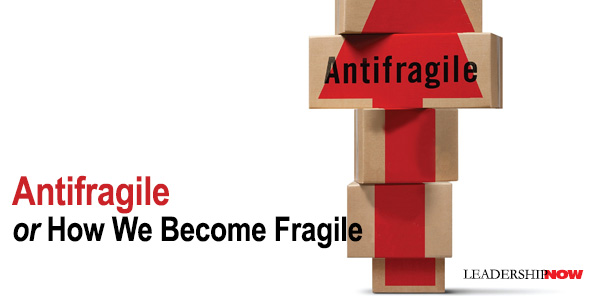 |
 |
01.08.13

Antifragile or How We Become Fragile
IN Antifragile, Nassim Nicholas Taleb reports on things that are fragile and things that are antifragile and how they became that way. Taleb says antifragile isn’t resilience given his narrow definition of it. It’s more. Resilience survives. Things that are antifragile don’t just survive, they get better with random event and shocks. The opposite is fragile. Though often unintentionally, we tend to make things fragile. We have been fragilizing the economy, our health, political life, education, almost everything … by suppressing randomness and volatility. … Complex systems are weakened, even killed, when deprived of stressors. Much of our modern, structured, world has been harming us with top-down policies and contraptions which do precisely this: an insult to the anitifragility of systems. By trying to make things simple and linear we run the risk of underestimating randomness and its role in everything. And more importantly, we fail then to benefit from them. Thus while we may be resilient or robust, we are not antifragile. “You only get a measure of order and control when you embrace randomness,” says Taleb. Our character should be antifragile. Random events should serve to make you better than before. Rules are fragile. Principles are resilient. Virtue is antifragile. Classroom learning is fragile. Real-life and experiential knowledge are resilient. Real-life and a library are antifragile. Success actually makes us fragile. We need to be antifragile to survive it. “When you are fragile, you depend on things following the exact planned course, with as little deviation as possible—for deviations are more harmful than helpful.” Mistakes and successes—especially those of others—give us a lot of information. If we can learn from them, they can make us antifragile. Taleb writes: My characterization of a loser is someone who, after making a mistake, doesn’t introspect, doesn’t exploit it, feels embarrassed and defensive rather than enriched with a new piece of information, and tries to explain why he made the mistake rather than moving on. These types often consider themselves the “victims” of some large plot, a bad boss, or bad weather. Randomness is not a bad thing. We make our organizations fragile when we are overprotective; when we try to iron out all of the variations and wrinkles that are a part of life. The longer we go without randomness, without variations, without setbacks, the worse the consequences when the unpredictable occurs. “Preventing noise makes the problem worse in the long run.” Yet we still think we benefit from protecting people and organizations from volatility—from life. It’s a practice with unintended yet harmful side effects. A fact of life: “no stability without volatility.” A little confusion can lead to teachable moments, growth and stability. Antifragile is an interesting and at times entertaining read. Taleb borrows from all disciplines to explain “how to live in a world we don’t understand or, rather, how not to be afraid to work with things we patently don’t understand, and, more principally, in what manner we should work with these.” 
Posted by Michael McKinney at 10:00 PM
|
BUILD YOUR KNOWLEDGE
 

How to Do Your Start-Up Right STRAIGHT TALK FOR START-UPS 
Grow Your Leadership Skills NEW AND UPCOMING LEADERSHIP BOOKS 
Leadership Minute BITE-SIZE CONCEPTS YOU CAN CHEW ON 
Classic Leadership Books BOOKS TO READ BEFORE YOU LEAD |